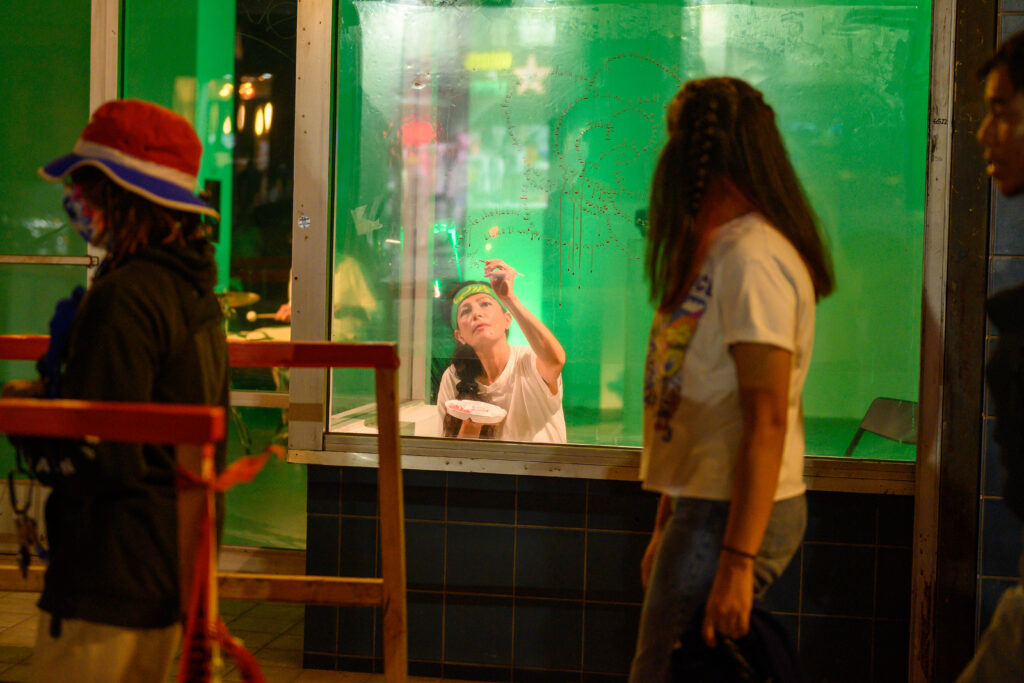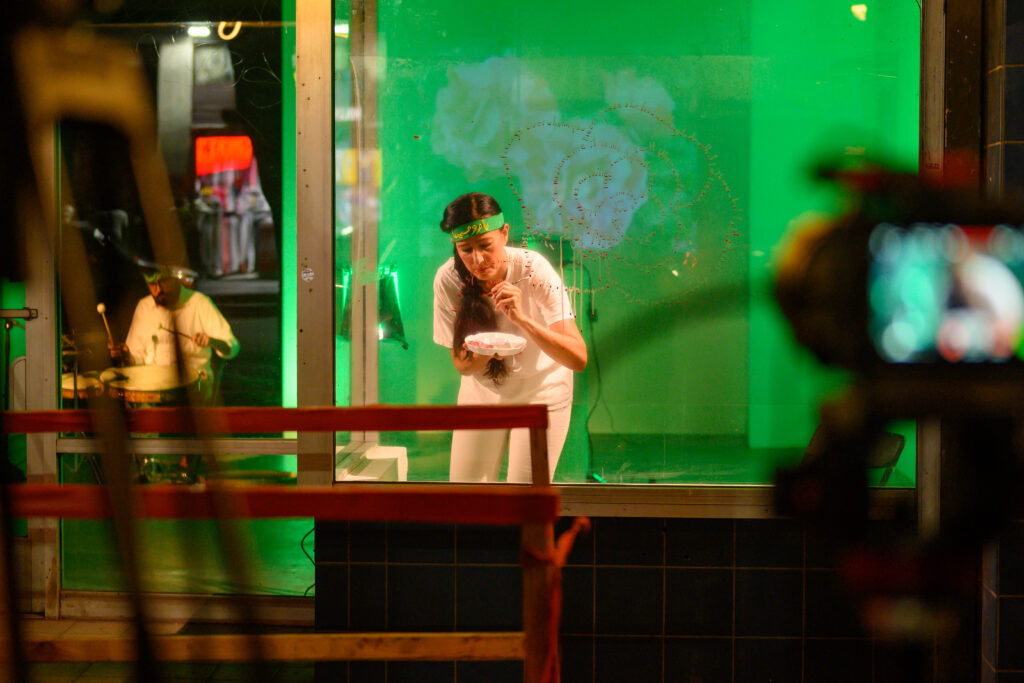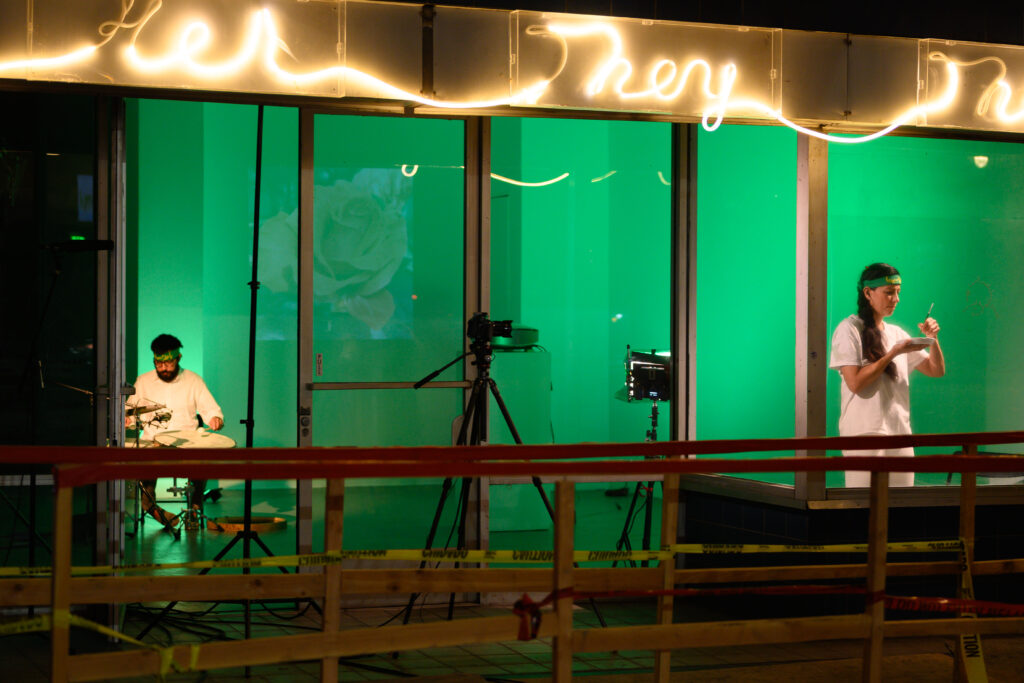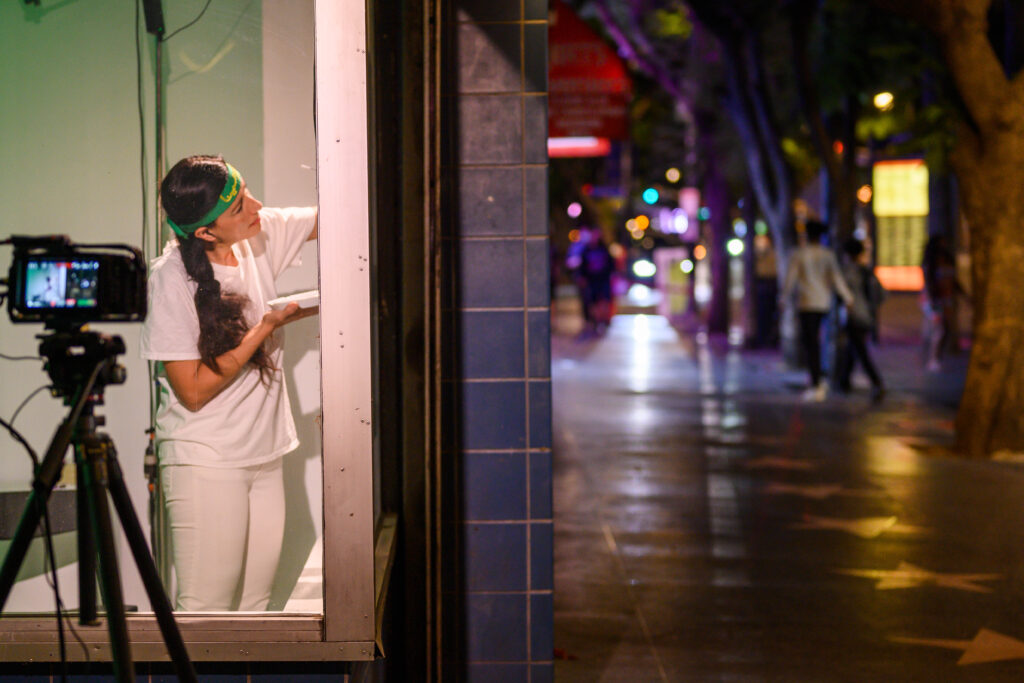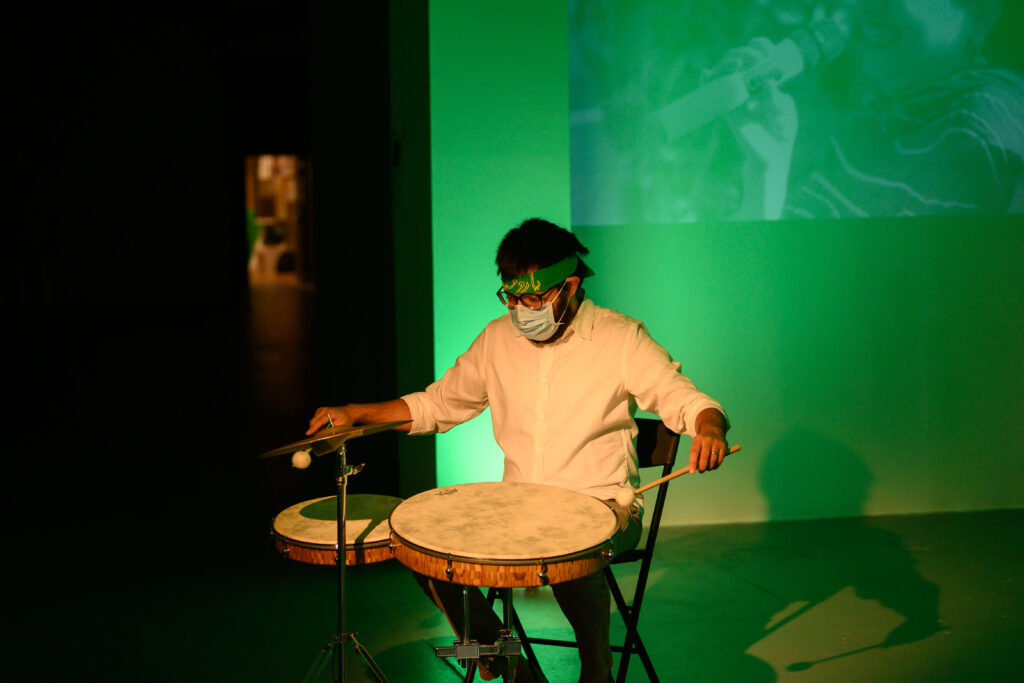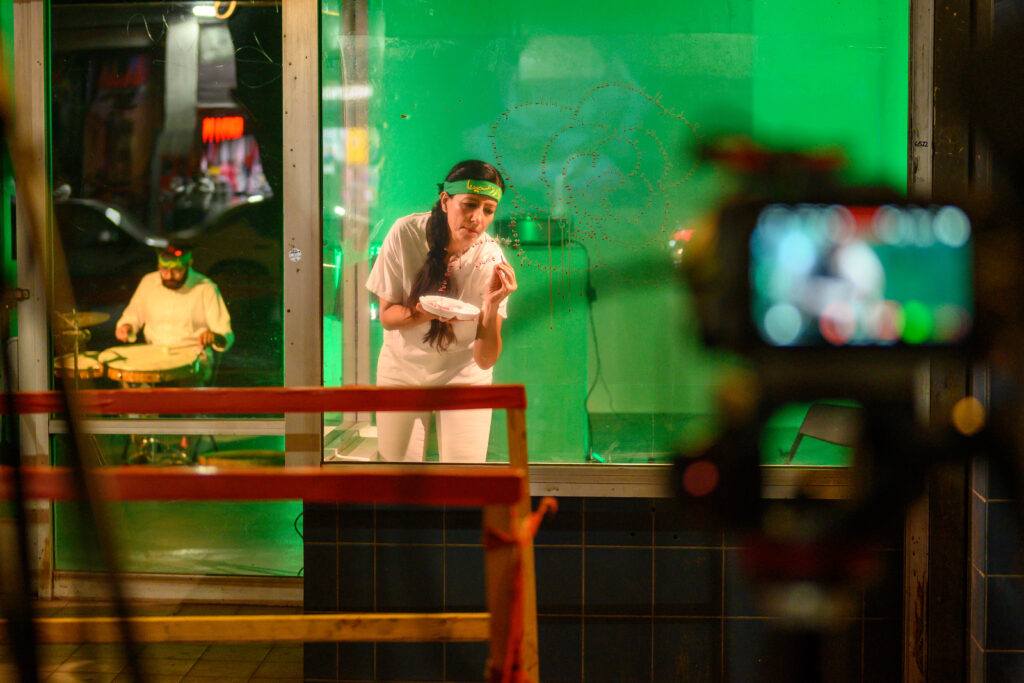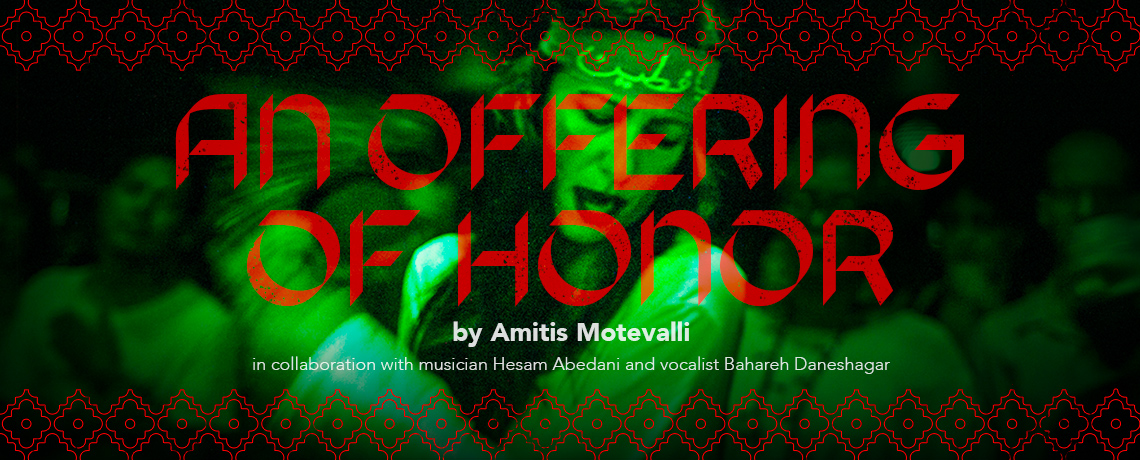 An Offering of Honor
An Offering of Honor
by Amitis Motevalli
in collaboration with musician Hesam Abedani and vocalist Bahareh Daneshagar
August 28, 2020 11:59 PM
On August 28 at 11:59pm PST (Ashura night), LACE presented a livestream performance/offering by Amitis Motevalli on Youtube to elevate the life and martyrdom of Romina Ashrafi at the storefront of LACE on Hollywood Blvd. Ashura night is a time of memoriam and commemoration of the assassination of the Prophet Mohammad’s grandson.
Motevalli’s performance challenges the normalization of domestic and intimate violence against women and the under-reported cases of femicide across the globe. The performance highlights patriarchal power structures interlaced with the idea of nation-state, the impact on its people, and the tense relationship between the US and Iran. During these unstable times, Motevalli reminds us of the importance of the ritual, mourning, and resistance. Read the artist statement below as well as Lyrics & Composition of the performance.
Lyrics by Amitis Motevalli
Composition by Bahareh Daneshgar
Translation by Pegah Sharifian with assistance by Angizeh Assadi and Fariba Emrani
English (PDF) |. فارسی (PDF)
Artist Statement
An Offering of Honor
To commemorate the life of Romina, I have performed an offering of my honor to those feeling like their honor has been stripped and feel the desire to punish. I have no need for mine. I performed on Hollywood Boulevard, projecting this ritual on the site that has made caricatures without depth. The term “honor killing” has troubling connotations for me. Something that plants roots and marks territory. In communication, the language around domestic and intimate violence and murder is often replaced with honor killing, bringing with it orientalist tropes.
In this performance, however, I am documenting an honor killing. The actual brutality, suffocation and attempted killing of an entire nation, the certain killing of large numbers of that nation by another nation that is given international legal backing to claim power and kill for the sake of their honor. The killing and suffocation of people caught in between the patriarchal nationalism of two nations’ militarized “honor”. Iran is not dead, but the people, it’s wildlife and nature are suffering abuse. I tell this tale through the story of Romina Ashrafy, an adolescent girl caught between two fragile egos at war with one another, claiming their right to ownership of her being, neither able to truly honor her. Sadly, she was killed. She is one of hundreds.
After the rapid spread of coronavirus in Iran, the United States intensified their already imposed sanctions, cutting off access to obtaining medical assistance and essential humanitarian aid. On top of this, the threat of war between Saudi Arabia or the United States created increased tensions and internal paranoia. Nationalism became as viral as COVID, giving a sense and need for self defense and conservative patriarchal measures.
It is no surprise that since January of 2020, the amount of domestic violence reported and witnessed skyrocketed. In June, a gruesome and horrific story started to spread about a girl named Romina Ashrafi and Iranians were outraged. An international debate on what outsiders called a “tradition” of honor killing in Iran also started a campaign of demonizing an entire nation, making justifications for invasion.
So little was discussed about what Romina was like when she was alive. We do know about her death. She lived in a small town in the Gilan province, close to the Caspian Sea in the northern region of Iran. Her household was abusive and like many girls in that situation, she looked toward marriage as an escape. Starting at age 12, a 29 year old man named Bahman Khavari, began courting Romina. Since she was a child, it may be best to say grooming her. By the age of 13 her father found out that she was talking to this man and threatened her numerous times for having a boyfriend. She said she wanted to marry him and her father refused to give permission. When Romina turned 14 she ran away and eloped with this now 31-year-old man. Her father called the police and asked them to find and return his daughter.
When found, Romina pleaded for her life, begging the police not to take her back. She said that her father would kill her, that he had threatened to kill her in the past. The police returned her to her family’s home. Legally, she was property that belonged to her father. As she expected she was met with her father’s rage. As Romina slept, her father beheaded her with a farming sickle.
It was rumored that prior to her return, her father Reza inquired about how long his jail sentence would be if he killed his daughter under such circumstances. He was told he would be imprisoned between 3 to 10 years, but likely only 3.
My own family is from the northern Iranian region of Mazandaran, right next to Gilan. I grew up being serenaded by my relatives, Gilaki songs about the preciousness of girl children. I cannot say that domestic violence is not rampant. I have witnessed it within my own close and extended family. I have also seen and experienced rampant domestic and intimate violence in the United States. When power becomes more important than love, there is a setting for oppression, either in a home between family, in a nation with its population and the state, or in the world between nations.
Through music, my friends Hesam Abedani and Bahareh Daneshagar and I will offer a new way to look at devotion through a Nohe (a specific genre of devotional music dedicated to historic religious martyrs). We shift the focus of dedication to look at the martyrs we see in our day to day lives. Through ritual, I perform a practice derived from my familiar and ancestral. I perform to devote myself to a girl caught between power struggles while remembering all of the girls, women, femmes killed so someone can validate themselves through a plastic sense of honor. All while looking out on Hollywood Boulevard.”
Since its founding in 1978, LACE has dedicated itself to providing an experimental platform for artists within our Los Angeles community to amplify the voices of the unheard. Among the artists connected to our ongoing genealogy of resistance and activism, is artist Amitis Motevalli, who has continuously participated in tracing LACE history.
Amitis Motevalli’s involvement with LACE traces back to our past venue in Downtown where she did her first performance. Other projects include her participation in “Democracy When? Activist Strategizing in Los Angeles” (2002) an exhibition, workshop and discussion series curated by Tone O. Nielsen. She also has a history of performances at LACE, debuting with her performance “Right; Rite; Write Piece” (2006) for The ReCut Project (conceived and directed by Ming-Yuen S. Ma), Burqa Girls: Shangri-La Remix (2014) and Dis…Miss (2016) launched by Freewaves.
Amitis Motevalli was born in Tehran, Iran and moved to the US with her family in 1977. In 1995 she received a BA from SFSU in Art with a minor in Women’s studies and in 1998 an MFA from Claremont Graduate University. Amitis’ work introduces a dialogue that simultaneously critiques the western view of so-called Middle Eastern women and points out the patriarchal underpinnings of her ancestral homeland’s identity. Motevalli engages with various mediums including sculpture, video, performance and collaborative public art. Her work juxtaposes iconography through iconoclasm, asking questions about violence, domination, occupation and the path to decolonization, while invoking the significance of a secular grassroots struggle. She currently lives and works in Los Angeles, exhibiting art internationally as well as organizing to create an active and resistant cultural discourse through information exchange, either in art, pedagogy or organizing artists and educators.
Musicians: Bahareh Daneshgar (Vocals and Composition), Hesam Abadani (Drums), Graphic Design: Navid Maghami (Designer), Crew: Wesam Nassar (Video), Pete Galindo (Additional Video/Production/Photo documentation), Daniela Lieja Quintanar (Curator and Production), support in production Nestor Guerrero and Juan Silverio. Thank You to all these amazing people!
Support for this project is provided by the artist and LACE.
Photos by Pete Galindo.
